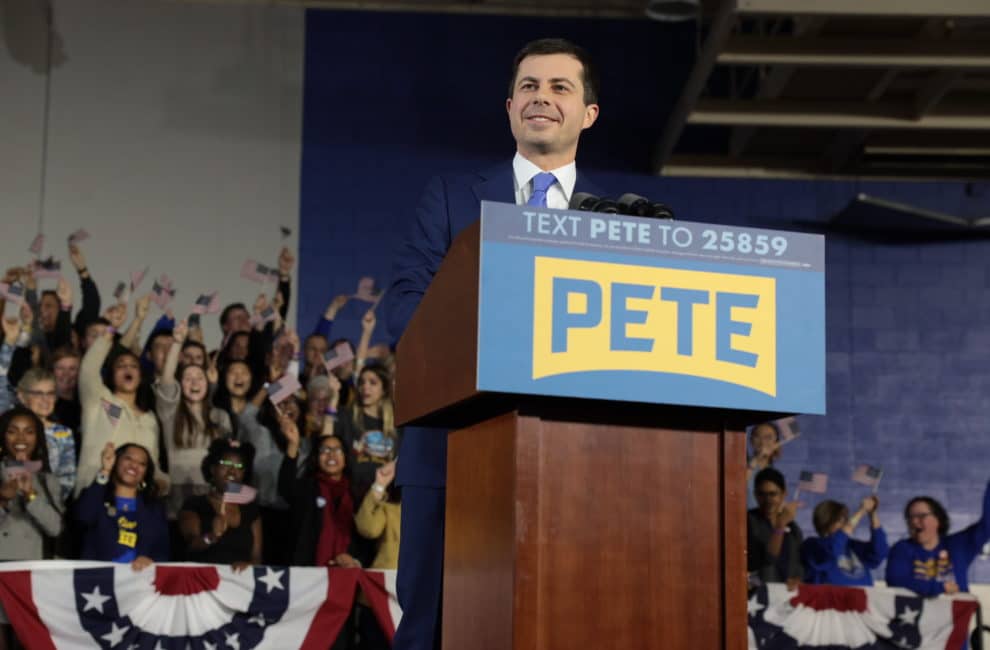How Pete Buttigieg Called His Shot In Iowa

Presidential candidate Pete Buttigieg delivers caucus night remarks at Drake University in Des Moines, IA on Feb 4, 2020. Chuck Kennedy/PFA
Pete Buttigieg loves board games. Risk is a favorite. So is Ticket to Ride, the object of which is to align tiny plastic trains across North America, laying tracks across a series of states along the way, a game not unlike a presidential primary. When they were plotting a presidential bid in the cold of a South Bend winter back in 2018, Buttigieg and Lis Smith, his senior adviser, along with his husband Chasten, would play the game during evenings.
Pete Buttigieg loves rules. He’s always known them better than most people. “I’m the only person who knows the rules,” his mother remembers him saying about football as a young kid.
It’s a fact his fellow Democrats—along with journalists, politicians, and pundits—learned this week in Iowa, where the former South Bend mayor is locked in a virtual tie with Vermont Senator Bernie Sanders (26.23 percent of the state delegate count to Sanders’ 26.06 percent), with 97 percent of the results tallied.
That Iowa result was not at all certain at the Bell Center on the campus of Drake University on Monday night. Buttigieg gave a victory speech that seemed to have everything—nods to “ordinary Americans,” mentions of the independents and Republicans who voted for him, talk of a “coalition no one saw coming.” “Tonight,” he said, “an improbable hope became an undeniable reality.”
At the moment, the victory speech was missing only one thing: an actual victory. As the world now knows, thanks to a shoddy, glorified calculator app that the Iowa Democratic Party failed to sufficiently test in the weeks before the caucuses, the hours after Iowans stopped caucusing had the feel of a massive pile-up at The Brickyard.
Days later, though, it appears Buttigieg called his shot. Though he missed out on a historic primetime speech because of the Iowa Democratic Party’s meltdown, Buttigieg, by declaring victory, has benefited from the audacious move. On Tuesday, traffic to his website surged. The campaign had its best fundraising hour yet. He gained nine points in the Emerson tracking poll—a serious bump from Iowa, though he still trails Sanders by 10 percent in what is nearly the Vermonter’s home state of New Hampshire. He’s blanketed cable and network television, including an appearance on The Late Show with Stephen Colbert Thursday evening.
How did he pull it off? Knowing the rules. He and his army of 170 Iowa staffers mastered the arcane rules of Iowa’s caucus system, which, similar to the electoral college, rewards candidates for running up the score in rural parts of the state. And so as his competitors focused on liberal college towns, Buttigieg’s campaign focused on the 31 Iowa counties that flipped from Obama to Trump in 2015, visiting 27 of them, and drawing the largest crowds in 20 of them. He went on to win 21 of these counties.
Buttigieg’s Iowa performance also began to show the outlines of what his supporters could look like in other states. He won among first-time caucus-goers. He won caucus-goers identifying as “somewhat liberal.” He overperformed with non-white caucus-goers, finishing second behind Sanders. He won women. He was second among men.
On Thursday at noon, Indianapolis Mayor Joe Hogsett is expected to file papers for Buttigieg to get on Indiana’s May 5 presidential primary ballot—and endorse his fellow Hoosier. In a statement ahead of the endorsement, Hogsett had this to share:
“Day after day, Hoosiers watch as the political climate in Washington produces more drama than results for working families. But for mayors across the country, we don’t have the luxury to embrace the divisive rhetoric and partisan posturing that has characterized national politics for far too long. It’s why in recent years we’ve consistently seen the biggest ideas and the best results coming from leaders in cities and towns that have rolled up their sleeves, put aside the politics, and focused on getting things done.
That’s why I am proud to endorse Pete, a friend that I have worked alongside and who represents the best of what makes America work. Pete’s ability to identify innovative solutions, work across party lines, and give hope to those disaffected with the status quo is exactly what our country needs right now.”
Now, in New Hampshire, independent voters could help him finish with a strong performance. After that, Buttigieg faces the real slog of the race, with the Nevada Democratic caucuses on February 22 and South Carolina’s February 29 primary, where he will face contests in states with the largest number of minority voters yet.
“This is the coalition that no pundit saw coming,” Buttigieg said Monday. “And it’s the coalition the president won’t see coming either. It’s a majority we’re assembling to agree not just on who we’re against, but on what we are for.”





